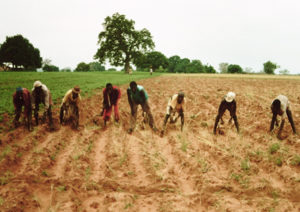John A. Agandin
TWO POEMS

Halting Words For Nab Sir Ayieta Azantilow I
All over the land of Buluk, over hills and fields
Where long grass grows and stout trees thrive
The trade wind comes racing, swelling about the trees
‘What news from the north, Oh hurrying wind?
What tidings do you bear in your dusty breeze?’
Have you seen Azantilow the tall and mighty
By sun, moon or by starlight bright?
Where now is he, the bold, the ancient, the brave?
Maybe you have heard the horn of the son of Ayieta.
Echoing in the hills and vales of the land.
Upon Azagsuk¹, long I stood and listened
Under the shade of Acham² I tarried in vain
Tell me not that he is no more!
But alas, his horn is silent, and his feet are cold
The north wind is still, impotent with tears.
Towards Akumcham³ ever shall I gaze
There our foes fled in dismay
Before its dying stump, ever I sigh
Under its withered crown ever I wait,
O, Ayieta biik, will you not return?
A trumpet-voice, jealous in honour, quick to love
A deadly sword, a burning brand, a chivalrous heart
A lord of wisdom enthroned upon the skin of Ayieta
Your work is a living landscape fair and bright
Your name is cast in gold in the annals of history.
Lord of Buluk, skilful genius that made us heroes
A visionary, with eyes that look deep and far
A weary pilgrim on the road of peace and unity
Oh that I were a master of words unchained
My halting words would paint you back to life.
Oh, that I were a bird with tongue unbound,
To loudly sound your praises everlastingly.
I would rouse men’s hearts with words of thee
And Buluk would once more flock to your banner
To drink deep of your ancient lore.
But alas in a corner of the rich earth of Buluk
There lies forever concealed, a richer dust,
A body of Buluk, born and bred therein
Blest by the fiery suns and the dusty winds
There you rest, entombed under a Bulsa heaven.
But though much is gone, much now remains
For that which we are, we are still
One heroic heart, strong in will to conquer
That in days of old moved heaven and earth
And inspired emulous missions among the gods.
Sweet repose my lord, rest thee well my liege
For thy labour upon the fields is done
In our midst your deeds stand, a mighty baobab
Undimmed by night shadows or clouds of grey
Shedding light and incense upon the infant crop.
Notes on “Halting Words for Ayieta Azantilow I
¹Azagsuk – An earth shrine located at Sandema-Fiisa which is believed to have been the site of a battle between the Bulsa and Babatu, a slave-raider. Some relics of the said battle are stored in a hole on the rock. The shrine is believed to have aided the Bulsa warriors in defeating the invaders.
²Acham (stanza – A shea tree (shrine) located at Sandema-Kandema which is believed to have aided Bulsa warriors.
³Akumcham – A shea tree (no longer in existence), under which the wife of Babatu the slave raider is believed to have died. The name may be literally translated as ‘death shea tree’ perhaps in memory of the killing of the slaver’s wife.
Stanza 8: Based on Rupert Brooke’s Sonnet: “The Soldier” (If I should die, think only this of me: …)

Farming Hymns (Kpari Yiila)
Weeding the fields couldn’t be more delightful!
Though backs are breaking in the noonday heat,
Palms blistering from gripping rigid hoe sticks,
Sweat trickling down the groins of labouring kinsmen,
And all their muscles are taut with effort,
The smell of dark loamy earth freshly upturned
Releases a singing trapped in the lungs of men.
The thrill of music banishes all weariness
And even the weakest muscle would gain
Momentum to break the moist earth with iron
Whilst hearts throb with the harmonious choruses;
Hymns that at once inspire, admonish, and entertain.
Chanting the village news as well as the secrets of men,
One is forced to pay as much heed as to work harder.
Every drop of gin sent coursing into half-empty bellies
Lends leverage to even unwilling tongues
And the sweetness of agreeable voices is released.
Every deed of men is censured or eulogized;
From sexual prowess to adulterous relations,
Nocturnal domestic quarrels and miserly neighbours,
And from mere gluttony to revolting avarice.
The scourge of stubborn ghosts and witches
The uncharitable host and his bitter pito
The sex-starved bachelor who knocked up the village retard
The man who jumped into the barn to examine his foreskin
The boastful imbecile who spends all the day at the tavern
Whilst his home and fields are overrun by wild weeds
Are all but themes for singing delightful tunes.
As the whisperings and theories are intoned,
The hoes rise and fall in unison and weeds are slain
Precious crops are freed from their strangling hold
And hopes for a good harvest are heightened.
In the house, women feverishly scrub pots and calabashes
In preparation to cook the evening meal
Whilst the happily-worried host has children chasing his prized ram.
Note on the Poem “Farming Hymns” (Kpari Yiila)
The Bulsa are mainly farmers. It is a common practice in the farming season for a man to request for support to weed his fields. The request could be directed at his neighbours, kinsmen, or in-laws. When a good number of labourers have gathered and are weeding the fields, it is customary for them to sing work songs and even play musical instruments whilst weeding. The themes for such songs are varied and may serve to compliment the host on what he is doing right or criticise his handling of them. Mostly however, the songs are about general happenings in the community or neighbourhood and may elicit laughter or chagrin from affected persons. The weeding is usually for a day but if the labourers are in-laws of the field-owner, they may stay for many days and even weed the fields of some kinsmen of the one who invited them. The provision of food and drinks (usually spirits, especially gin) is the responsibility of the field owner. The abundance of gin is frequently an incentive for diligence and for loosening the tongues of men to sing.
- Contents of BULUK 12
- Editorial
- Events
- Who on Earth is interested in the Bulsa?
- Discussions in the Facebook Group “BULUK KANIAK”
- New Published and Unpublished Studies on Bulsa Culture
- The Sights, Sounds and Glitter of Feok 2018
- Report on BHCS Exhibition of Bulsa Material Objects at Feok 2018 in Sandema
- Bulsa Pomp and Pageantry
- John A. Agandin: Two Poems
- The Medical System of the Bulsa
- List of Plants for Medicine and Other Purposes
- Dental Health – the next lifestyle disease?
- Free surgical procedures by Dr. Benjamin Akinkang’s Team of Hope
- Ambulance not on the Road: A Disgrace to Health Care for Buluk
- Management of Perceived Malaria Infections in Children among Bulsa Mothers